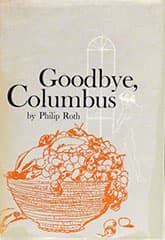Defender of the Faith
Critique • Quotes
 Collection first edition, 1959
Collection first edition, 1959First publication
1959
Literature form
Story
Genres
Literary
Writing language
English
Author's country
United States
Length
Approx. 9,500 words
A tribal secret revealed
Outside discussion of Philip Roth's 1959 story, the expression "Defender of the Faith" has applied mainly to Christians. A title originally given by the Pope, it has passed down through European royalty who have been heads of their state religions.
Which makes me wonder: what would be the response to Philip Roth's story "Defender of the Faith" if the characters were members of a cultural group other than Jewish?
In the story as written, a Jewish-American army sergeant near the end of the Second World War first helps and later resists three Jewish soldier trainees who trade on their shared ethnicity to wheedle favours, including keeping them out of the Pacific conflict after the war in Europe is over.
Suppose instead these characters were Catholics in a mainly Protestant military, or were blacks or Italian-Americans or any other minority? Or suppose they were part of a majority group seeking entitlements due to their dominant status?
My feeling is it would still be a pretty good story. "Defender of the Faith" is a beautifully written, well-plotted narrative—almost a novella—about the struggle between these characters.
And not nearly as simplistic as any one-sentence summary suggests. Apart from detailing the back and forth of the intriguing between the sergeant and the trainees' ringleader, the story reveals the sergeant's own doubts, his temptations, and his own complex relationship with his higher-ups. His motivations are not entirely clear either, as he is clearly trying to sort them out for himself. At the end it's uncertain he thinks he's made the right decision. (The "I" of the narrating sergeant, by the way, is not the author. In 1945, Roth was twelve.)
The war at the back of the mind
Despite the complexity of characterization, this is not at all a difficult text. There's nothing experimental in the writing—the straight-ahead prose styling uses plain words and brisk dialogue in the manner of earlier great twentieth-century American writers who honed their craft in magazine pieces for mass consumption. ("Defender of the Faith" first appeared in the The New Yorker.) The plot and characters keep drawing you through the story's forty-odd pages.
So, yes, it's such a good story it could work with figures from different backgrounds. But it would not have the same impact.
Part of what keens the interest in the story as written is the thought at the back of the reader's mind that the war—for which the trainees had been training and in which the Jewish sergeant had already engaged—was a fight against the most dangerous anti-Semite in history. It seems particularly disturbing that some Semites would be angling for an easier time of it in the army that had helped win that war.
But why is it shocking that a few Jews might be portrayed as feeling their shared community entitled them to special treatment? Aren't there such opportunists in every group?
Well, yes, but this hadn't been made clear in the case of Jewish-Americans before. One hears and one expects tales of Jews suffering pitifully from prejudice or valiantly resisting persecution, and then from out of the Jewish-American community comes Philip Roth saying, "You know, there are some in our tribe who exploit this sympathy for their private ends."
This wasn't news for the Jewish-American community but some were scandalized that Roth revealed it to the wider world in "Defender of the Faith" (as well as portraying Jews warts and all in other stories and novels).
In 1959 this revelation had a massive impact in the United States. And although the shock and the cries of "self-hating Jew" have long died away, the story is still provocative for what it shows—about any people.
— Eric
Critique • Quotes

